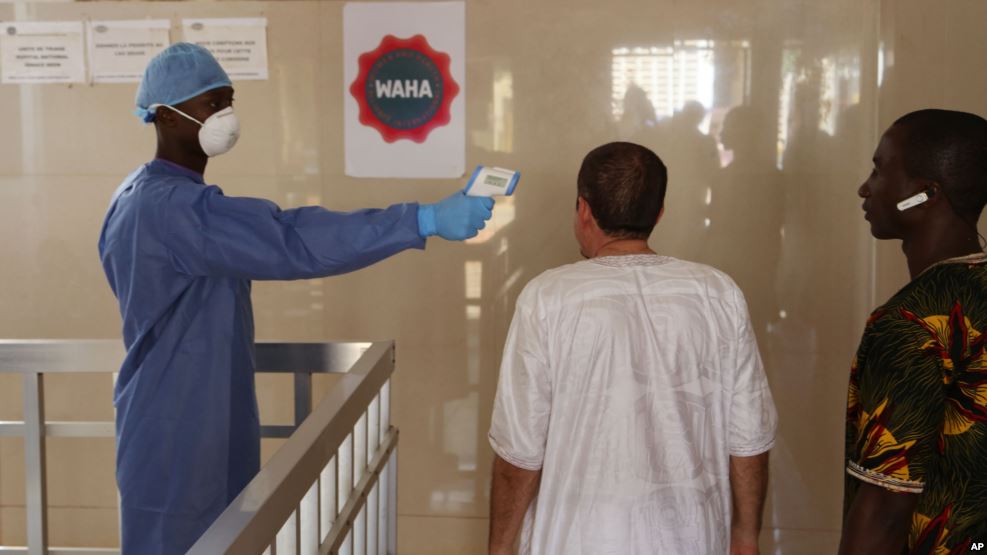导读:科学家发现了五种已知的致死性埃博拉病毒所共有的一个隐藏弱点,并成功地利用两种抗体来封锁其入侵人体细胞的能力。

LonDON — Scientists have found a hidden weak spot shared by all five known types of the deadly Ebola virus and successfully targeted it with two antibodies that blocked its ability to invade human cells.
伦敦报道——科学家发现了五种已知的致死性埃博拉病毒所共有的一个隐藏弱点,并成功地利用两种抗体来封锁其入侵人体细胞的能力。
In early stage laboratory experiments published in the journal Science, the researchers developed a "Trojan horse" strategy that allows engineered antibodies to hitch a ride on Ebola to where the virus is most vulnerable before hitting it.
早期实验室试验阶段的进展刊登在了《科学》杂志上。研究人员发明了一种“特洛伊木马”策略,让经过改造的抗体在埃博拉病毒最脆弱的时候“搭顺风车”并予以打击。
"The success in co-opting the virus itself to dispatch a lethal weapon ... marks a turning point in development of smart therapeutics against infectious diseases," said M. Javad Aman, a scientist and president at the U.S. biotech firm Integrated BioTherapeutics who worked on the team.
“让病毒本身变成致命武器……这个成功标志着传染病智能治疗学发展的一个转折点。” 美国生物技术公司“生物治疗”的科学家兼主席、在团队中工作的科学家M·贾维德·亚曼说。
Although years of testing lie ahead before any fully approved treatment might be developed for Ebola patients, Aman said similar strategies could also be devised against several other viral and bacterial pathogens.
虽然前面还要经过数年的试验,针对埃博拉病毒患者的疗法也要完全得到批准,但是亚曼说,相似的策略经过改造,可以用来治疗其他几种病毒和细菌性病原体感染。
Ebola is an extremely deadly and contagious disease for which there are currently no regulator-approved vaccines or treatments. A vast outbreak of the Zaire strain of the virus, which causes hemorrhagic fever, killed more than 11,000 people and infected around 29,000 in West Africa in 2014-15.
埃博拉是一种极度致命的传染病,现在没有正式批准的疫苗或者疗法。该病毒的扎伊尔分支能够引起出血热,于2014-2015年期间在非洲西部大爆发,造成超过11000人死亡,约29000人感染。
Monoclonal antibodies, which bind to and neutralize specific pathogens and toxins, have emerged as the most promising treatments for Ebola. But a critical problem is that most antibody therapies — including the most promising experimental therapy, ZMapp — target only one specific Ebola virus.
与特定病原体和毒素绑定并削弱其毒性的单克隆抗体,是最有希望治愈埃博拉病毒的疗法。但是大多数抗体疗法有一个严重的问题——包括最有希望的实验性疗法ZMapp——那就是只能针对某种特定的埃博拉病毒。
In this work, the research team found a way around this by targeting a weak spot — in the so-called lysosome of the cell — to where antibodies could hitch a ride on Ebola and deliver a punch that blocked the virus’ exit and ability to replicate.
在这项研究中,研究团队围绕这一点,通过针对病毒的弱点发现了一种方法——在细胞溶酶体中——“搭顺风车”并予以狠狠一击,这样就能封锁病毒的退路并抑制其再生的能力。
The strategy could eventually be developed for use in a range of other viruses, the scientists said, including cousins of Ebola such as Marburg, and other viral diseases such as dengue or Lassa.
科学家表示,这种方法最终可以发展为其他一系列病毒的疗法,包括埃博拉病毒的兄弟马堡病毒以及其他病毒性疾病,如登革热和拉沙热病。
"It’s impossible to predict where the next Ebola virus outbreak will occur or which virus will cause it," said Jon Lai of the Albert Einstein College of Medicine in New York City, who co-led the work. "We hope that further testing in nonhuman primates will establish our antibodies as safe and effective for treating those exposed to any Ebola virus."
“我们还没有办法预测下一次埃博拉病毒在哪里爆发、是由什么引发的。”团队的共同负责人、纽约阿尔伯特·爱因斯坦医学院的黎世豪说,“我们希望我们的抗体未来在非人灵长类动物身上的试验,对治疗那些感染任何一种埃博拉病毒的人来说是安全有效的。”







